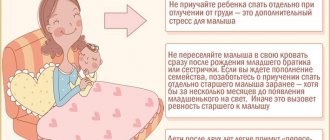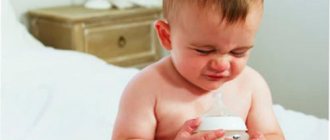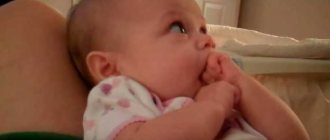If women who feed their children with milk are thinking about how to wean their baby from the breast, then mothers of artificial babies are looking for answers to the question of how to wean their child off the bottle. Habits associated with the sucking reflex are quite difficult to overcome.
However, weaning off the bottle at a certain point is still necessary, since artificial mixtures or cereals cannot satisfy the needs of a growing person for vitamins and other useful elements.
Good nutrition also includes eating “adult” food, drinking from a mug and using cutlery. But this is in the future, now it is necessary to speed up the separation of the baby from the bottle, and this, let’s say right away, is not the easiest process. But doable!
Natural and artificial feeding
Children who are breastfed from the first days of life practically do not become attached to a container with a pacifier. Before the introduction of complementary feeding, mother's milk is both food and drink for them, and the breast is the primary means of calming.
To prevent an infant from getting used to a bottle, you need to give him water or dill water for colic from a spoon, using a syringe without a needle or an infant sippy cup. Closer to 6 - 8 months, you can begin to get acquainted with the cup.
However, for various reasons (for example, a lack of breast milk, a serious illness of the mother or her departure), the child still has to be given a bottle with a substitute for a natural product. Also, using a container with a pacifier is important on the street or during long trips.
Thus, artificial babies are forced from birth to receive nutrition from a bottle. However, sucking itself in infancy is not limited solely to satiation. For children, this is also a special ritual associated with calming and relaxing before falling asleep.
Many children develop the habit of going to bed with a bottle. Naturally, in such a case it is quite difficult for them to get rid of a peculiar ritual, since this threatens to leave the formed zone of psychological comfort.
In psychology
Psychologists say that a pacifier is for a baby like valerian for his parents. When they cannot cope with his whims, they take away his favorite toy - a bottle. She calms the child down. He loves to suck on everything: mom's breast, pacifier, and bottle. It is worth depriving him of the latter when anxiety and stress cannot cope with the child’s soul.
Usually he calms down by one and a half to two years of age. But, you say, this is at odds with physiology. Yes and no. Until this time, the child will not constantly be with the same bottle as at the age of three months.
Leave the bottle with nipple and milk overnight. This is even better than plugging his mouth with a pacifier. During the day, feed him what pediatricians recommend for this period of life.
Do I need to wean it off?
You can often hear the opinion that the child himself will decide when to give up the bottle.
Like, he will grow up, mature, and begin to be shy, for example, of his more independent peers. A sound idea, if not for one thing.
The desire to give up a container with a pacifier may arise in a child, for example, only at 3 or 5 years old. And what should parents do, wait for the right moment?
In adult children, sucking is no longer a reflex, but a habit, and it is quite convenient. Judge for yourself: you can drink water from a bottle at night without waking up. Why change anything?
Thus, if a grown-up child does not want to part with his “buddy” on his own, parents need to intervene in this process. Why is it worth weaning your baby off the bottle? There are several arguments:
- Sucking on a pacifier can cause malocclusion and affect tooth growth. It should be noted, however, that this opinion is not shared by all pediatricians and orthodontists.
- There is also an opinion that constantly having a pacifier in the mouth can lead to incorrect pronunciation of individual sounds. Naturally, this cannot but affect the development of speech as a whole.
- Children who fall asleep holding a bottle drink a lot of liquid, which affects the frequency of urination. This is why it becomes difficult to potty train a child and stop using diapers.
From the point of view of psychological science, the children's habit of drinking milk or other drinks from a bottle before falling asleep is harmful because it slows down the rate of psychophysical development. That is, children retain infantile skills that inhibit the formation of more adult skills.
In addition, not all mothers are psychologically resistant to sympathetic glances, gossip or direct accusations of parental incompetence from people who see a 3-4 year old child with a bottle. In addition, the baby himself will feel a kind of pressure, which may negatively affect his self-esteem in the future.
Everything has its time
There are no uniform standards for when to wean a child off the bottle. An attentive and sensitive mother usually feels when it is time to start weaning - usually this age is 1, 2 years. You should not rely on the age at which other children wean themselves from their favorite toy, nor should you rely on the experience of grandmothers or the opinions of friends. Each fidget is unique, and the age at which this can be done easily and comfortably is different for everyone. One baby is ready to wean as early as one year, while another may take much longer. Most pediatricians agree that 3 years is the deadline for a small person to eat from an adult container.
However, general signs that the baby is ready to wean can be observed. For example, if your baby already sits well on his own, is able to hold a mug or spoon in his hands, shows interest and reaches for a cup on his own, then you can safely begin the transition to “adult” utensils.
There are children who at some point refuse a bottle or pacifier, most often this happens between the ages of 14 and 18 months. But if this didn’t happen to your baby, then this is absolutely no reason to be upset, you’ll just have to put in a little more effort. And remember that the older the baby, the more difficult it is to wean him from his usual actions and rituals.
If your child has not shown a desire to part with the bottle by the age of two, then you do not need to wait any longer. According to the advice of pediatricians, at this age it is already necessary to begin the transition to adult dishes and abandon night feedings.
When should you wean your baby off the bottle?
It is extremely difficult to name any exact age limits, since each child develops at his own individual pace, and becomes attached to the bottle in a special way.
That is why parents should monitor, first of all, the physical readiness of the baby to say goodbye to this infant attribute. It includes several parameters according to which the baby:
- sits without support;
- holds a spoon in his hand and understands why it is needed;
- uses it to scoop food from a plate and put it into the mouth;
- drinks from a cup or sippy cup;
- shows interest in adult food;
- has teeth and has the skill of chewing.
Typically these skills are fully developed by 12 months. The extinction of the sucking reflex should also be taken into account, since in the absence of this adaptive mechanism, the weaning process will go faster. Closer to 2 years, the physiological need to suck a bottle completely disappears.
There are situations when it is necessary to wean a baby off the bottle urgently, without waiting for physical and physiological readiness. For example, if you soon need to go on a trip, during which it will be impossible to sterilize the container and pacifier and dilute the mixture.
Bad time for “experiments”
So, if the child does not want to give up the bottle, he will still have to be weaned. It is only important to follow certain rules in order to avoid stressful situations and not harm the child’s psyche. You should choose the right time for this.
It is best to begin weaning from a container with a pacifier at a time when a child’s life is stable and calm. Stop breaking the habit if:
- child is sick;
- he has a brother/sister;
- the family is on the verge of divorce or you and your spouse have recently separated;
- the baby is going through a period of adaptation to a nursery or kindergarten;
- At the same time, the baby is accustomed to the crib;
- planning to move to another place of residence.
During these emotional experiences, the bottle allows the baby to calm down. And refusal of such a “sedative” is fraught with an increase in the stressful situation.
It is believed that summer is the best period for weaning off the bottle. Perhaps this belief is due to the fact that in the autumn-winter period immunity decreases, and giving up the bottle and, accordingly, stress can provoke a deterioration in the body’s defense system.
If a child not only drinks from a bottle, but also sucks on a pacifier, the refusal of both devices should be consistent in order to reduce the likely inconvenience and the number of children's whims.
First of all, you need to remove the bottle and switch to eating from a plate and mug. At this time, the pacifier will be used only for falling asleep quickly, and after about 3-4 weeks, when the baby forgets about the bottle, you can get rid of the pacifier.
Slow way
A comfortable solution for mother and child. Night feeding gradually disappears from family life, the child has time to adapt to the new feeding schedule, and the woman’s lactation gradually decreases.
To do this, the child eats milk porridge before going to bed, and, full and satisfied, sleeps peacefully all night. If he wakes up at night, he receives the usual bottle with the mixture, but 10 ml less in volume. Once every 3-4 days, the portion of the mixture is reduced by 10 ml, so the nutrition is gradually reduced to a minimum and completely removed.
For breastfed babies, it is recommended to focus on feeding before bed, replace the breast with a pacifier to fall asleep, and at night offer a bottle of water and rock it. Moreover, this should be done by the father, grandmother or nanny, otherwise, feeling the mother’s smell, the child will demand the breast. Be patient, the baby will be capricious for 2-3 weeks, and then he will settle into a new routine and sleep soundly throughout the night. Remember, during such a period it is important to pay even more attention to the baby, hug and kiss more often, demonstrating love and tenderness.
How to wean yourself off the “daytime” bottle?
At first, try going without a bottle during the daytime. Be sure to purchase cutlery and light plastic dishes with bright patterns for your child. Kids really like images of characters from their favorite cartoons or fairy tales.
Offer your child to drink milk, water or juice from a mug or a special sippy cup (it all depends on age). The last device is a container with a sealed lid and two holders. There is a silicone spout at the top, which allows your baby to drink rather than suck, without getting wet.
In the store you can buy a sippy cup of any shape, color and size. These sippy cups are also suitable for going outside. You just need to choose a device with a protective cap that protects the spout from dirt and dust. If your child gets thirsty and there is no sippy cup nearby, give him a juice box with a straw.
If the baby is capricious and demands to drink in a bottle, you should switch his attention to new cups and plates and offer to repeat after his mother. Pour the milk into mugs or sippy cups and have breakfast together. Children love to imitate their parents and repeat certain actions after them.
A 2-year-old child can be invited to play a little by pouring juice into mugs and having a competition “Who can drink it faster.” Naturally, the adult needs to give in so that the baby emerges as a winner and experiences positive emotions from his winnings.
However, you should not get too carried away with gaming techniques. Tomorrow, lunch or dinner is not a game, but still a certain procedure, a ritual. Let your child get used to taking food seriously from childhood.
Sometimes mothers are a little tricky by pouring diluted or salted milk into a bottle, and tasty milk into a purchased mug. Children, having tried the contents of both containers, give preference to the one in which the tasty drink is poured.
Practical advice
First of all, go to the store together and choose a comfortable, unbreakable mug or sippy cup with him, preferably with a bright design or image of his favorite characters. Choose lightweight containers that your baby can hold with liquids. First of all, the future owner should like the dishes. Let him make his own choice.
A sippy cup can become a transitional stage between a bottle and a mug. It’s convenient to drink from, your baby won’t spill himself, and it’s easy to hold in your hands, but you won’t be able to suck from it. After the sippy cup, you can move on to the mug.
Children are wonderful imitators; they are happy to repeat after adults. Therefore, it’s time to seat your baby at the table with you, provide him with new beautiful dishes and offer him to eat with a spoon and drink from a mug like everyone else. Your growing baby will certainly want to be like mom and dad. And if there are also older brothers and sisters in the family, then this technique will work.
Before bedtime, you can have family tea parties with a beautifully set table, sit with cups of Turkish tea right on the carpet, or maybe you invite your baby to invite all his toy friends to a tea party? In such cases (and for the baby this will be a great event) there is no place for bottles and nipples. Your child will feel this himself and will easily abandon his girlfriend.
You can already talk to children over two years old and prepare them for parting with their much-loved object. Together you can think of someone who could use a bottle. For example, it can be given to a baby who was recently born to your friends, or to a deer at the zoo. Or this container will be more necessary for the new baby doll, the care of which will be taken over by your baby. Children like to do something nice and be useful, so this way is quite effective, but it also increases your child’s self-esteem. He has a reason to be proud: “That’s how big I am,” “That’s how I helped.”
Some parents use a trick and make the drink in the bottle not tasty, for example, adding salt. On the contrary, what the baby loves most is poured into the mug. Such tricks often bear fruit, and the baby himself decides to abandon the bottle that has become “tasteless.”
In this matter, as well as in other aspects of raising children, it is worth showing imagination and ingenuity. We can say with confidence that your child will respond with pleasure to all your ideas. You should come up with a story or ritual, taking into account what he loves, his character, and temperament. And then success will undoubtedly await you.
There is a rather unusual, but interesting way of weaning. The parent secures the container on a vertical surface so that the baby can drink from it, but cannot remove it. The baby can come up to suckle, the bottle is freely available, but he will no longer be able to take it with him to the crib or for a walk. Gradually, the child weans himself from the bottle and approaches it less and less.
How to wean your child off the bottle at night?
During the day, babies actively explore the world, so they are ready for new emotions and experiments, including replacing a bottle with a mug or sippy cup. Another thing is the night period, because the pacifier becomes an important part of the ritual of falling asleep and gives the child a feeling of security and relaxation.
How to stop a small child from drinking at night if deprivation of a bottle leads to tears, tantrums and sleep disturbances? It is necessary to choose techniques that would allow the baby to calm down and relax without the usual pacifier and bottle.
For a one-year-old child, physical contact is very important, so the mother should sit next to the baby before falling asleep, hold the hand, stroke the tummy, etc. It is also worth changing your bedtime ritual by eliminating the bottle and introducing reading a fairy tale or singing a lullaby.
If the baby is already two years old, it is worth trying to come to an agreement with him. Explain in accessible language that adult children should not sleep with a bottle like newborn children. Just don’t shame the baby by calling him a doll, etc.
Soft toys can also help wean you off the bottle. Buy your child a new teddy bear that will be comfortable and pleasant to hug. You should also take more walks before bed, play active games during the day, and take relaxing baths in the evening.
What can you expect?
Many mothers who weaned their child off the bottle had to deal with tears, whims, demands to return the container of milk or formula, and even hysterics. It is quite possible that everything will go smoothly for you, but you should be mentally prepared for some unpleasant situations.
Don't give up, even if you feel very sorry for the baby. Usually, after a few days, the child gets used to eating and drinking almost like an adult, and doesn’t even remember the bottle. If the parent returns the bottle at the first cry, the baby will understand that tears and hysterics are a sure way to achieve what they want.
However, it is worth distinguishing manipulative behavior from real problems. If a child begins to refuse food and cries all the time, you should show him to the doctor. Perhaps he was just sick. In this case, you can return the bottle for a few weeks, and then begin the weaning process again.
Parents will also be required to use their imagination. Even the most capricious baby can voluntarily refuse the bottle if this event is presented correctly. For example, offer to give a container with a pacifier to a familiar cat or dog that is feeding its offspring. It really works!
The question of how to wean a child from his favorite bottle needs to be decided individually. For some, buying a sippy cup helps, for others, buying a teddy bear helps. Some people wean themselves off the bottle at one year old, while others constantly carry it around with them even at two years old. That is why it is important to focus only on your child and seize the right moment.











